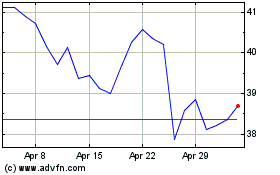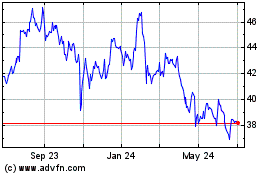By Brody Mullins and John D. McKinnon
WASHINGTON -- The election of Donald Trump has sparked one of
the most pitched lobbying efforts in Washington in years as the
prospect of business-friendly policy changes has companies from the
airline industry to Wall Street launching new blitzes.
Oil and gas firms are pressing to roll back federal regulations
on drilling. Verizon Inc. and other large telecommunications firms
want changes to the Obama administration's net neutrality rules.
Airlines are seeking stronger enforcement of an aviation agreement
that they believe favors foreign carriers on the most prized
international routes. Boeing Co., Lockheed Martin Corp. and other
defense contractors are scrambling to protect against cuts in the
Pentagon's budget.
"People are getting out the agendas that they have had for
years, but never thought could happen," said Ed Kutler, a longtime
Washington lobbyist. "Now, all of a sudden, people are firing with
real bullets because things can be passed and go to a president who
has his pen ready to sign."
Mr. Trump said on the campaign trail that he wants to "drain the
swamp" in Washington and curb the influence of lobbyists and
special interests. But his election has been a boon for
Washington's influence sector as airlines, defense contractors,
tech companies, retailers, manufacturers and others seek to advance
their agendas.
Lawmakers are getting "a lot of contact and a lot of outreach"
from hopeful businesses seeking regulatory relief and other
changes, said Rep. Tom Cole (R., Okla.), a senior House member.
Business-focused initiatives in Congress this year are likely to
include repeal and replacement of President Barack Obama's
signature health-care law, a sweeping tax-code rewrite, and repeal
of a range of environment and energy rules.
Lobbyists for Wall Street already are pressing Congress to
rescind a range of Dodd-Frank era regulations that they say are too
onerous.
McDonald's Corp., Choice Hotels International Inc. and other
restaurant, hotel and retail companies are pushing to overturn an
Obama administration decision to make it easier for unions to
organize employees at franchises like McDonald's.
Led by a Washington trade group, the International Franchise
Association, the industry is seeking legislation to permanently
overturn a 2015 decision by the National Labor Relations Board.
That effort stood little chance of overcoming the opposition of
national labor unions and a Democratic president, but gained new
life with Mr. Trump's victory.
"It's a whole new opportunity to go on offense in a way that we
had not expected," said Matthew Haller, a senior vice president at
the trade group.
The franchisees got another boost when Mr. Trump named Andrew
Puzder as his secretary of Labor . Mr. Puzder served on the board
of the International Franchise Association and resigned his seat
last week.
Mr. Trump isn't the first president to come to Washington with a
pledge to rein in the influence-peddling industry. Mr. Obama made a
similar promise when he took office eight years ago.
Companies, labor unions and interest groups spent a total of
$3.2 billion on lobbying in 2015, the last year for which complete
figures are available, down slightly from $3.3 billion spent on
lobbying in 2008, the year before Mr. Obama took office, according
to lobbying data compiled by the nonpartisan Center for Responsive
Politics. However, the decline likely had more to do with lobbyists
reducing the activity they reported on disclosure forms, rather
than a real decline in lobbying activity.
Companies must disclose new lobbying hires, but due to a time
lag in the disclosure rules, it is too soon to determine the
precise number of lobbyists who have been hired since Mr. Trump's
election.
Many industries say Mr. Trump's statements on the campaign trail
should translate to new momentum for their causes. U.S. airlines
say Mr. Trump's charge that some trade agreements favor foreign
concerns means that his administration should enforce an aviation
agreement that they say currently allows foreign carriers such as
Qatar Airways of Qatar and Emirates of the United Arab Emirates to
get an unfair advantage on some lucrative international routes.
American Airlines Inc., Delta Air Lines Inc. and United
Continental Holdings Inc. say the Gulf carriers are violating the
agreement, known as Open Skies, by using government subsidies to
fly newer planes at cheaper prices.
Delta CEO Ed Bastian said last month that the Open Skies
agreement should be the first test of Mr. Trump's promise to use
trade policy to protect U.S. jobs. "We should be the poster child
in terms of the opportunity for this administration to enforce
trade agreements," Mr. Bastian told investors during a conference
on Dec. 15. "We're very encouraged by our new president's platform
to enforce American trade agreements and to bring back American
jobs," Mr. Bastian said.
Defense contractors, Detroit auto makers and some manufacturing
firms are building lobbying campaigns to protect themselves from
possible unwanted changes from a Trump administration. Defense
contractors have come under attack from Mr. Trump, who has
frequently criticized expensive government contracts with Boeing
and Lockheed Martin involving both Air Force One and the Pentagon's
newest jet fighter.
"The defense industry began the Trump transition expecting a
sizable increase in defense spending, however some of his
appointments and tweets have left the industry confused and a bit
worried," said Loren Thompson, a defense-industry consultant in
Washington.
Oil and gas firms, for example, are preparing a broad effort to
roll back regulations they said make it hard to drill for oil and
gas and build new pipelines. They hope to wrest control of the
issue from environmental groups, who had successfully blocked key
projects, such as the Keystone Pipeline, during Mr. Obama's
term.
Verizon and other major U.S. telecommunications firms are
readying a push to roll back net-neutrality regulations put in
place by the Obama administration. The Obama administration was
much more closely aligned with Google, Netflix Inc. and other
internet firms that favored the rules, which require internet
service providers such as Verizon to treat all web traffic
equally.
"We're going to see spending like we've never seen before" on
overhauling net neutrality and related telecommunications rules,
said Michael Copps, a Democratic former member of the Federal
Communications Commission who now advises the left-leaning advocacy
group Common Cause.
Write to Brody Mullins at brody.mullins@wsj.com and John D.
McKinnon at john.mckinnon@wsj.com
(END) Dow Jones Newswires
January 10, 2017 05:45 ET (10:45 GMT)
Copyright (c) 2017 Dow Jones & Company, Inc.
Comcast (NASDAQ:CMCSA)
Historical Stock Chart
From Mar 2024 to Apr 2024

Comcast (NASDAQ:CMCSA)
Historical Stock Chart
From Apr 2023 to Apr 2024
